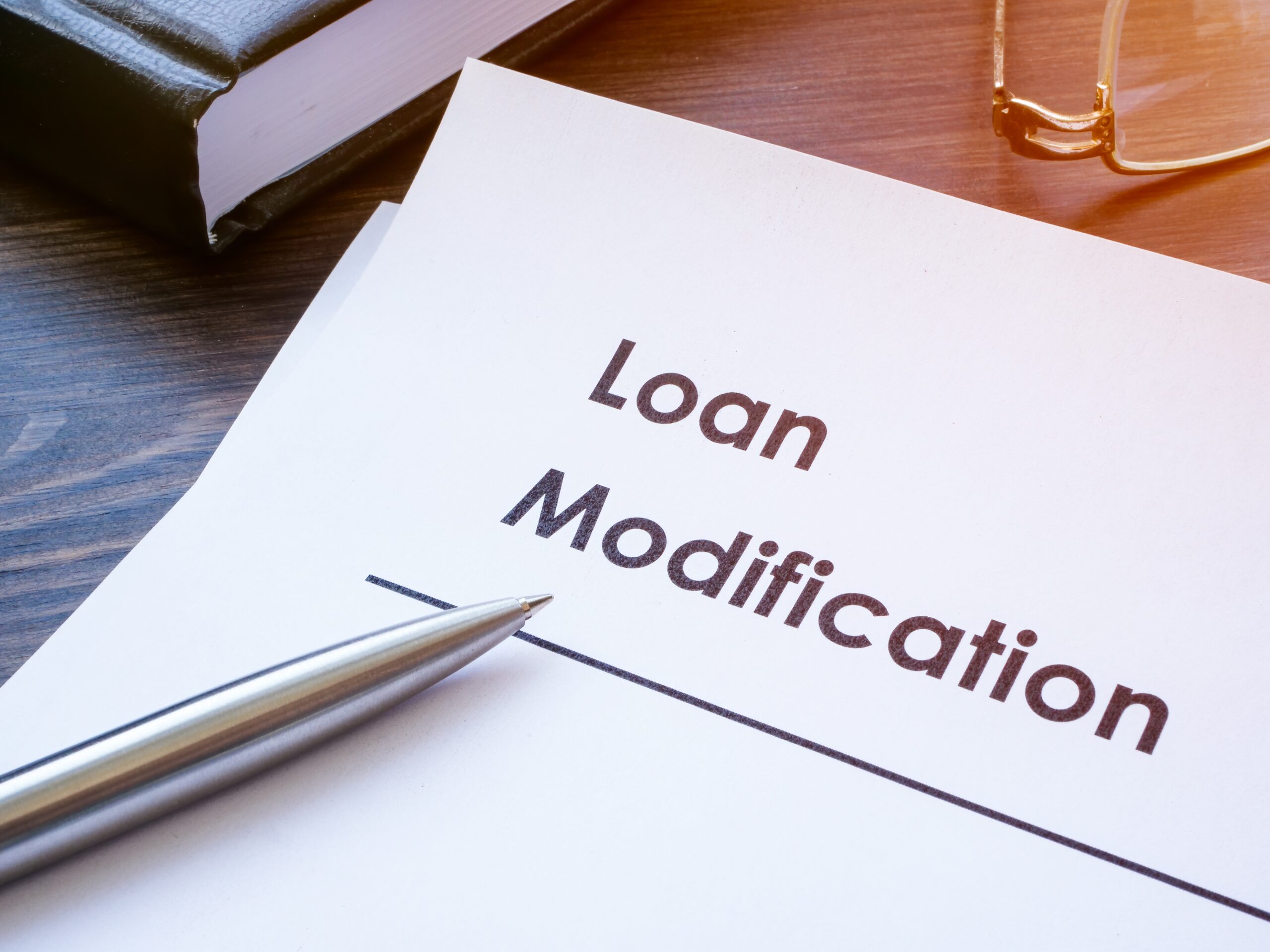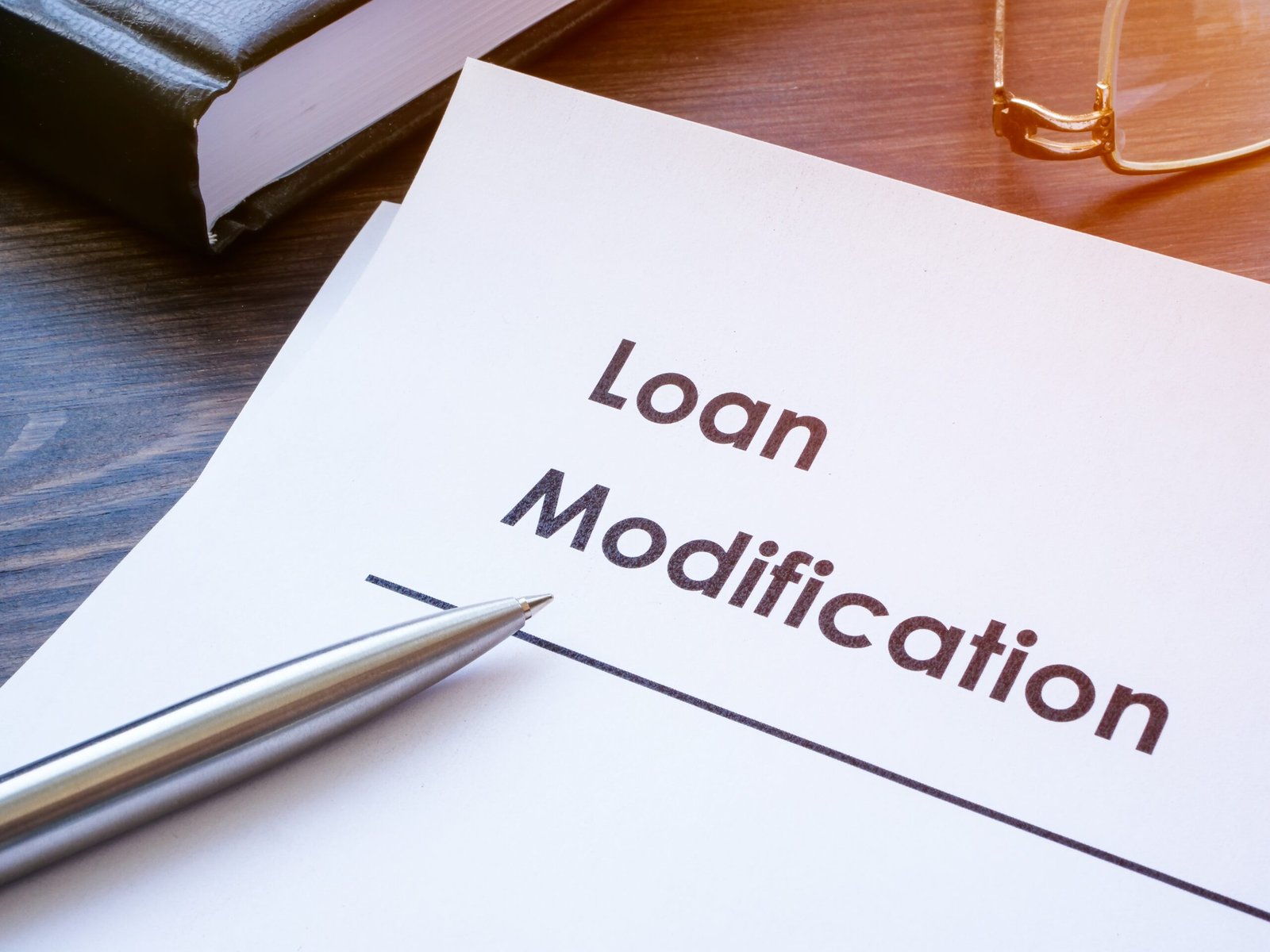Loan Modification
A loan modification is when a lender alters the conditions of an existing loan. It can involve a different loan type, a more extended grace period, a cheaper interest rate, or any combination.
These modifications are typically made due to the borrower’s inability to repay the original loan. Most effective loan modification processes include the assistance of a settlement business or an attorney. A few borrowers qualify for government help with loan modifications.

How does a mortgage modification work?
A mortgage modification helps you stay current on your loan and in your house by lowering your monthly payments to a manageable amount. One or a mix of these modification options could be used:
Reduce the interest rate, resulting in lower monthly mortgage payments and long-term interest savings. Increase the repayment duration: Your mortgage payments will be less per month if the loan term is extended. (However, a longer payback time will result in more interest accruing, raising the loan cost overall.)
Principal reduction: In some circumstances, the lender may forgive a portion of the loan sum to reduce your monthly payments. Remember: The IRS considers forgiven debt income, so you must disclose it on your tax return.
Change an adjustable-rate mortgage to a fixed-rate mortgage: An adjustable-rate mortgage has an interest rate that changes occasionally. Your monthly payments can become unaffordable if they increase. You have much more financial stability when switching to a fixed-rate loan.
Check your lender or servicer to learn your new monthly payment and if the loan change is temporary or ongoing. If you need more clarification about the long-term effects of a difference, always read the fine print and ask questions.
You should compare the total payments for your initial and updated loans. You want to avoid a temporary reduction to result in the lowered amount being put back into your mortgage balance, which would require you to pay interest on the higher sum.
Avoid changes that result in a huge balloon payment due after a set amount of time, are interest-only and adjust to a higher rate, or add unneeded expenditures to your loan in the form of fines, fees, or processing charges, advises Sharga.
These improvements are only prudent if you intend to hold onto your house long enough to sell, preserving your equity and credit.
How to Qualify for a Mortgage Modification?

Although each lender has a different set of guidelines for mortgage modifications, generally speaking, you must demonstrate that:
You must catch up on at least one regular mortgage payment, or payment will soon be missed.
You’ve experienced severe financial difficulties because of things like:
- chronic disease or incapacity
- death of a family member, resulting in a loss of income
- Sudden rises in housing costs, such as increases in real estate taxes or homeowner association dues
- Divorce
- natural calamity or emergency
- Loss of insured property
Your principal residence, not an investment property, a rental property, or a vacation house, is the property for which the change is requested.
If your mortgage is guaranteed by any of the following federal agencies or programs, consult with your lender (not the relevant agency) to determine if you qualify for a government mortgage modification:
- The federally supported organizations Fannie Mae and Freddie Mac, which hold most single-family mortgages in the United States, share a Flex Modification program. If a borrower is behind on payments or is about to go into foreclosure, it is accessible on mortgages that are at least a year old.
- You may be qualified for several relief programs, including mortgage modification, if you have an FHA loan—a mortgage sponsored by the Federal Housing Administration.
- Veterans who have VA Loans—mortgages backed by the U.S. Department of Veterans Affairs—both in active duty and in retirement, as well as surviving spouses, are eligible to apply for loan modifications and other foreclosure prevention measures. The VA advises borrowers to speak with federal housing counselors for support and inquire with their lenders about ways to avoid foreclosure.
How to Get a Mortgage Modification?
If you can’t pay your mortgage, a mortgage modification may help. A mortgage modification involves changing the terms of your existing loan to make it more affordable. Here’s a general guide on how to get a mortgage modification:

- Assess Your Situation: Determine if you’re eligible for a mortgage modification. Generally, lenders are more likely to consider your request if you’re facing financial hardship, such as a job loss, medical emergency, or significant reduction in income.
- Contact Your Lender: Contact your mortgage servicer (the company that collects your mortgage payments) when you recognize that you are experiencing financial difficulties. Many lenders have specific departments or teams dedicated to handling loan modifications.
- Prepare Documentation: Your lender will require documentation to assess your financial situation. It may include recent pay stubs, tax returns, bank statements, a hardship letter explaining your circumstances, and other relevant financial information.
- Fill Out Application: Your lender will provide you with an application for a mortgage modification. Complete and accurately fill out the application, including all required documentation. Some lenders might also have an online portal for submitting this information.
- Propose Modification Terms: In some cases, you can propose modification terms that would make your payments more manageable. It could include requesting a lower interest rate, extending the loan term, or even deferring a portion of the principal to the end of the loan.
- Wait for Review: The lender will review your application and documentation to assess whether you qualify for a mortgage modification. This process can take some time, so be patient and responsive to any requests for additional information.
- Negotiate: If your lender provides a modification offer, review it carefully. You can negotiate the terms if you believe they’re not sufficient or feasible for your situation. Sometimes, lenders are open to adjusting the times to ensure your ability to make payments.
- Accept the Offer: If you’re satisfied with the modification terms, formally accept the offer as per the instructions provided by your lender. It might involve signing documents and returning them to the lender.
- Comply with Trial Period: Some lenders might require you to complete a trial period during which you make modified payments to prove your ability to handle the new terms. It’s crucial to make these payments on time and in full.
- Finalize the Modification: Your lender will finalize the modification Once you complete the trial period and comply with all requirements. It could involve updating your loan agreement and terms.
Not all mortgage modifications are accepted; the procedure varies by lender, loan type, and conditions. It’s recommended to communicate openly with your lender throughout the process and seek professional advice, such as from housing counseling agencies or legal professionals specializing in real estate and mortgage matters.
How Does a Modification of Your Mortgage Affect Your Credit?
A mortgage modification can affect your credit both positively and negatively, depending on the circumstances your lender reports it and how you handle the process. Here’s how a mortgage modification can potentially impact your credit:

- Positive Effects:
- Reduced Payment Burden: If you were struggling to make your original mortgage payments and the modification results in more affordable terms, it can help you avoid missed payments and potential defaults. It can be positive for your credit score since late payments and defaults have a significant negative impact.
- Improved Payment History: If you successfully make on-time payments under the modified terms, your payment history will improve, which is crucial in calculating your credit score.
- Negative Effects:
- Temporary Dip: When you first apply for a mortgage modification, your lender might report the account as being in a hardship program or being modified. It can temporarily negatively impact your credit score since it might be interpreted as a sign of financial difficulty.
- Potential Reporting Errors: Mistakes can happen during the modification process, such as miscommunication between you and the lender or errors in reporting to credit bureaus. These errors could lead to incorrect negative information on your credit report.
- Loan Restructuring: Some mortgage modifications involve restructuring the loan, including extending the term or deferring part of the principal. It can affect the overall debt-to-income ratio, impacting your ability to obtain new credit.
- Longer-Term Impact: If the modification involves extending the loan term, your credit history related to the mortgage will be developed as well. While this isn’t inherently negative, it might influence lenders’ perceptions of your creditworthiness.
- Tips for Minimizing Negative Effects:
- Communication: Stay in close touch with your lender throughout the modification process to ensure accurate reporting to credit bureaus and promptly address potential errors.
- Monitor Your Credit Report: To verify the adjustment is recorded appropriately, review your Equifax, Experian, and TransUnion credit reports regularly. Dispute any inaccuracies you find.
- Keep Paying on Time: If you’re in a trial period as part of the modification process, ensure you make all payments on time and in full. It will help maintain a positive payment history.
- Understand the Terms: Fully understand the terms of the modification, including how it will impact your monthly payments, interest rate, loan term, and overall financial situation.
In summary, while a mortgage modification can initially have some temporary adverse effects on your credit, the long-term impact can be positive if you manage the change well by making on-time payments and effectively communicating with your lender. If you need clarification about how a modification might impact your credit or if you’re facing challenges during the process, consider seeking advice from credit counseling agencies or financial professionals.
Alternatives to Mortgage Modification:
Other options are available if a mortgage modification is not best for you, but you still need to manage your mortgage at a difficult time.

- Repayment schedule: If you can restart regular mortgage payments after a few missed ones, a repayment schedule can temporarily raise your monthly payments until you’ve paid the amount you missed (plus interest); at this point, your costs will return to normal.
- Mortgage forbearance: Borrowers experiencing short-term financial difficulties should consider a mortgage forbearance plan. For up to 12 months, your payments are suspended or reduced; however, you must resume your regular payments and pay back any excused charges.
- Refinancing: You can refinance your mortgage with a cheaper loan if you have strong credit and interest rates are more favorable than when you received your initial mortgage.
- Short sale: If you owe more on your home than it is worth, your lender can agree to a quick deal, taking the selling profits to pay off your mortgage. Although it can have serious tax repercussions, this might be a better option than foreclosure.
- Deed instead of foreclosure: During an act in lieu process, you voluntarily give the mortgage lender ownership of your home in exchange for being released from the loan terms and payments. You might have to make up the difference if the mortgage balance is greater than the home’s value.
Bottom Line:
Mortgage modification might help you keep your house if you’re experiencing financial difficulty by lowering your monthly payments. Staying in your home can reduce stress, even if mortgage modification may raise your long-term borrowing expenses and temporarily harm your credit. Contact your lender to see what assistance they might offer if you’re concerned about losing your home to foreclosure.
It may be challenging to avoid damaging your credit scores while applying for a mortgage modification, so it’s a good idea to monitor the situation and follow your recovery once you resume regular payments by keeping a check on your credit reports and credit score.










Post Comment